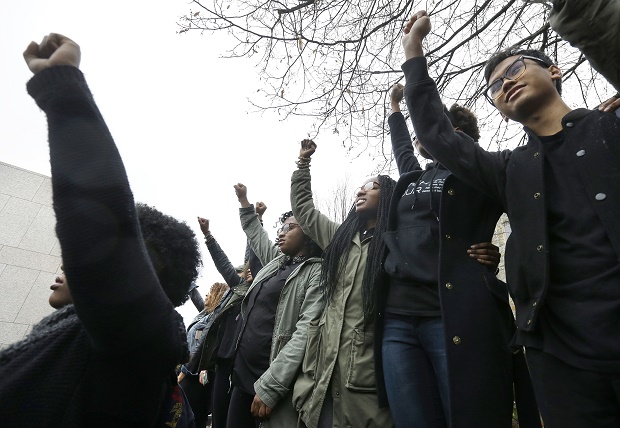
Students at Boston College raise their arms during a solidarity demonstration on the school’s campus, Thursday, Nov. 12, 2015, in Newton, Mass. The protest was among numerous campus actions around the country following the racially charged strife at the University of Missouri. AP
BOSTON — Thousands of students across the U.S. took part in demonstrations at university campuses Thursday to show solidarity with protesters at the University of Missouri, and to shine a light on what they say are racial problems at their own schools.
Students at some schools said they were emboldened to take a harder stance against racism by the protests that topped the Missouri president, who was criticized for his handling of racial complaints. Some of the Missouri students said they were inspired by the protests in nearby Ferguson, where the police killing of an 18-year-old black man helped give rise to the nationwide “black lives matter” movement.
From Boston College to campuses at the University of California, dozens of schools saw walkouts and rallies.
While the Missouri protests were triggered in large part by complaints about slurs and other overt racism on campus, some students at Thursday’s rallies said it’s a subtler brand of prejudice that motivated them to take a stand.
READ: US university names black president to defuse race row
Many said they face daily instances of casual racism and insensitivity. There’s even a word on campuses these days for subtle slights against minorities: microaggression.
“It’s more the daily microaggressions than the large situations,” said Akosua Opokua-Achampong, a student at Boston College. “Those also hurt.”
Sheryce Holloway said she is tired of white people at Virginia Commonwealth University asking if they can touch her hair or if she knows the latest dance move.
At Chicago’s Loyola University, student Dominick Hall said groups of white guys stop talking when he walks by, and sometimes people grip their bags a little tighter.
Katiana Roc said she will never forget the day two years ago when she sat down in class at West Virginia University and a white student a few seats away collected his things and moved across the room.
“He looked uncomfortable. I’m pretty sure he moved because of the color of my skin. It didn’t hurt my feelings,” said Roc. “What disappointed me was his ignorance.”
She added that just being on campus can be a day-to-day struggle.
“But instead of me saying that I’ll transfer where I feel more comfortable, I’d rather stick it out here,” she said. “I’m not here for how people look at me; I’m here for my education.”
Stories like that aren’t new, students said. But many said the revolt at Missouri has driven them to talk about it and confront it.
In recent days and weeks, students at some colleges have presented administrators with their own demands, inspired by those of the protesters at Missouri.
Often, the demands call for greater diversity on the faculty, more spending on scholarships for minorities, more instruction on tolerance and sensitivity, and more resources such as cultural centers.
Universities have responded by hosting diversity forums in recent days, or meeting to hear demands.
Students at some schools, such as the University of Michigan, said the Missouri case has emboldened them to take a harder stance against administrators if they don’t keep their promises.
Holloway, from Virginia Commonwealth, said she has sometimes tried to ignore subtler instances of racism. But now, she said, she has decided not to keep quiet anymore.
“It’s hard when it’s something you see every day,” she said. “It’s exhausting. It’s fatiguing and, you know, we’re frustrated.”